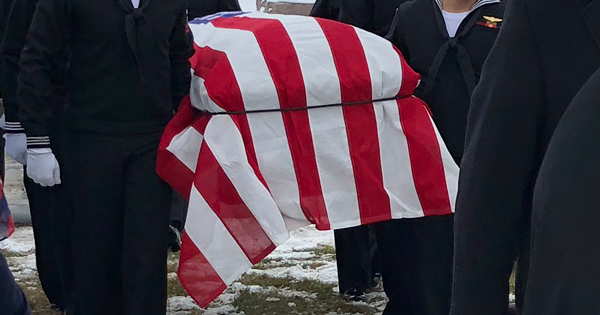


Finally, home
Photo by Mark Moline January 02, 2018
Project Recover discovery in 2014 brings closure to WWII airman’s family
Each December, Wreaths Across America volunteers place holiday greens at the resting place of fallen American heroes to commemorate their service and sacrifice.
There is one more World War II serviceman to honor in Michigan now, thanks to the combined efforts of many, including University of Delaware’s Mark Moline and his colleagues at Project Recover.
Project Recover is a partnership between a collaborative team of marine scientists, archaeologists and volunteers with the University of Delaware, Scripps Institution of Oceanography and The BentProp Project who have combined efforts to locate aircraft and associated missing airmen from WWII. Moline’s work with Project Recover began in 2014 with the discovery of a U.S. TBM Avenger and an F6F Hellcat in the waters off the island of Palau, which was a hotbed for combat during WWII.
Moline, director of the School of Marine Science and Policy within UD’s College of Earth, Ocean, and Environment, recently attended the funeral of Albert P. “Bud” Rybarczyk, who perished when his TBM Avenger crashed in 1944.
“This was the first case we had worked on and the first aircraft the team had found together,” Moline said. It also was the first time the Project Recover team attended the funeral of a veteran they helped find.
“It was a pretty incredible outpouring…the church was packed,” with with townspeople, firefighters, police officers, military service members and others who turned out to support airman “Bud” Rybarczyk’s only surviving sibling, Mary Ann Rybarczyk, who Moline said was a matriarch of the town.
Moline met Rybarczyk’s family, as well as family members from Ohio of another serviceman who died in the aircraft.
Moline and others in attendance from Project Recover were humbled when the group’s efforts to find the downed plane were recognized during the eulogy and drew applause from those in the church.
As a marine scientist, Moline never conceived that his work would lead him to attend the funeral someone who served in WWII. Being a part of bringing closure to one family, he said, only fueled the Project Recover team’s collective desire to keep going.
In a poignant close to the funeral mass, the 1940s-era classic “I’ll be home for Christmas,” was played as attendees departed the service.
“It was pretty emotional, but it’s also a huge motivator that reinforces what we are doing is a good thing,” Moline said.
More than 73,000 U.S. service members are still unaccounted for from World War II.
Project Recover blends historical and archival data from multiple sources to narrow underwater search regions, then surveys the areas with scanning sonars, high definition imagers, advanced diving, and unmanned aerial and underwater robotic technologies.
Since 2014, Project Recover has located and identified 20 aircraft that are associated with servicemen reported missing in action. Project Recover has conducted missions in numerous countries in both Europe and the Pacific over the past three years, having just completed a mission in Papua New Guinea. Project Recover works closely with the Defense POW/MIA Accounting Agency (DPAA), responsible for recovery and official identification of remains, family notification, and repatriation.
About Project Recover
Project Recover is a public-private partnership to enlist 21st century science and technology combined with in-depth archival and historical research in a quest to find the final underwater resting places of Americans missing in action since World War II to provide recognition and closure.
With initial support from the Office of Naval Research, Project Recover was established in 2014 and formalized in 2016 with the generous support of Dan Friedkin, whose substantial gift allowed Project Recover to expand operations globally, increase its tempo of operations, and increase the number of sites located and documented.
Contact Us
Have a UDaily story idea?
Contact us at ocm@udel.edu
Members of the press
Contact us at 302-831-NEWS or visit the Media Relations website

